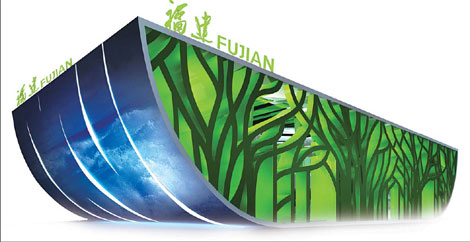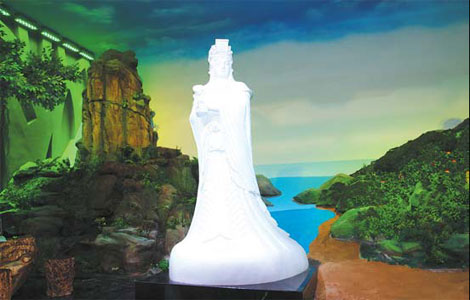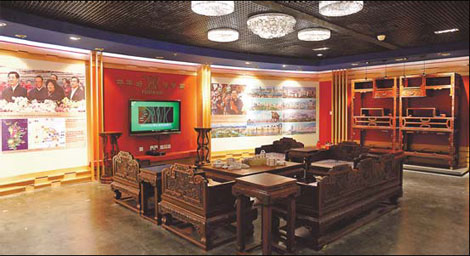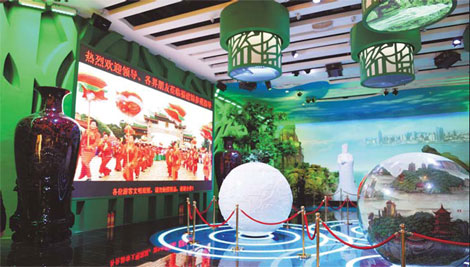Fujian
Fujian treasure trove sails into Expo
By Hu Meidong, du Li and Lu Wei (China Daily)
Updated: 2010-04-30 08:06
 |
Large Medium Small |
|
An artistic rendering of the Fujian Pavilion. Photos provided to China Daily |
|
A marble sculpture of the sea goddess Mazu, standing at 3.23 m high. |
|
A wooden table where Fujian's tea ceremony will be exhibited during the Expo. |
|
Inside of the interactive zone. |
The Fujian Pavilion resembles a ship in green, blue and white and represents the geographical location of the province on the western bank of the Straits.
The pavilion occupies a floor space of 600 square meters and is decorated with banyan tree patterns -the provincial emblem.
Inspired by the architectural idea of the sea melting into the sky, the Fujian Pavilion offers an insight into the province's landscape and culture.
Four zones
The pavilion is divided into four zones: a scenic zone; interactive zone; showcase zone and treasures zone.
In the scenic zone, there is a large marble sculpture of the sea goddess Mazu, standing at 3.23 meters high.
There are also screens highlighting Fujian's typical landscape including the Wuyi Mountain, Gulangyu Islet and Jiuqu Stream.
In the interactive zone, three big balls, each with a diameter of 2 m house the artistic works of bodiless lacquerware, Dehua white porcelain and lacquer carving. In the showcase zone, visitors can learn about tea culture, porcelain and lacquerware and watch performances telling stories from Fujian's history. These will include puppet shows and Nanyin music, a traditional opera sung in the Minnan (south Fujian) dialect.
The treasures zone, decorated with mahogany wood in the ancient style, will exhibit collections of precious historical artifacts.
Green Fujian
There are nine municipal cities in Fujian including Fuzhou, Xiamen, Quanzhou, Zhangzhou, Putian, Longyan, Sanming, Nanping, and Ningde, as well as 85 county-level cities, counties and districts.
The province has the most forest coverage in China. The air quality and water quality of the major rivers are also among the best in the country. The area is also known for its scenic spots. Popular resorts include the Wuyi Mountain, Gushan in Fuzhou, Tailao Mountain in east Fujian and Wanshiyan in Xiamen.
The province also has many beautiful beaches, such as the beach on Gulangyu Islet of Xiamen, the Luanwan Beach on Dongshan Island, the Longwangtou Beach at Pingtan and Meizhou Island at Putian.
Its numerous rivers offer many picturesque spots, including the Jiuqu Stream in Wuyi Mountain and Jinhu Lake.
Opening-up
The province was among the first to open up to the outside world and was a pilot zone of reform in China.
Since ancient times, white porcelain, from Dehua in Fujian, has played a significant role in international trade.
The province has also produced a host of famous people, including Lin Zexu, a scholar and official during the Qing dynasty (1644-1911) who was known as the first Chinese person in modern China who opened his eyes to look at the world, as well as Yan Fu, a scholar and translator famous for introducing Western ideas.
Fujian has established trade relations with 219 countries and regions worldwide. Over 120 multinational companies have invested in 176 projects in the province. Among the top 500 Chinese businessmen in the world, 200 entrepreneurs come from Fujian province.
Fujian-Taiwan
Fujian has a close relationship with Taiwan, with 80 percent of Taiwanese residents of Fujian descent.
Xiamen was one of the first cities in China to be opened up to foreign trade and investment as a special economic zone (SEZ) in 1979.
Because of the closeness both geographically and culturally with Taiwan, the Xiamen SEZ has targeted Taiwan to attract Taiwanese investment and facilitate bilateral trade. Over the last few decades, Fujian has maintained close business and trade connections with Taiwan.
In May 2009, over 8,000 Taiwanese compatriots participated in the first Straits Forum, and it is hoped that this will become an important platform for cross-Straits communication.
Harmonious province
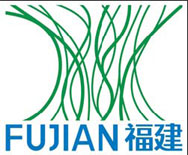
Fujian has always made great efforts to create a harmonious society and cultural environment.
The province was the one of the earliest to implement a minimum living standard security system, waive tuition fees for urban and rural students at the compulsory education stage, as well as incorporate rural workers in the unemployment insurance scheme.
The province has a special tea culture. Anxi Tieguanyin tea, Oolong tea, Tanyang Kung Fu tea and Fuding White Tea will be on show at the Expo.
Treasures
Four of the province's greatest treasures will be displayed in the pavilion. These are the peony bodiless lacquer vase, the largest laquer vase in China, and Shoushan stone carving masterpiece made in Fuzhou, Dehua porcelain made in Dehua, and the Mazu statue made in Hui'an.
The Shoushan stone named "Spring Song" is the world's largest stone carving masterpiece , worth 130 million yuan. It is 0.78 m wide, 1.4 m high and 56 birds of various shapes carved on the stone symbolize the harmony and unity of the 56 Chinese ethnic groups of China.
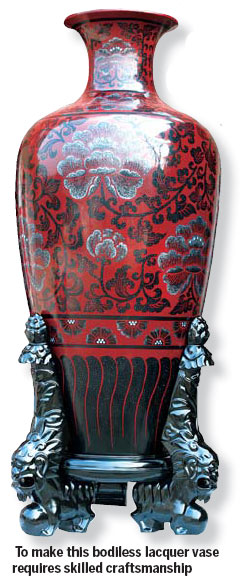
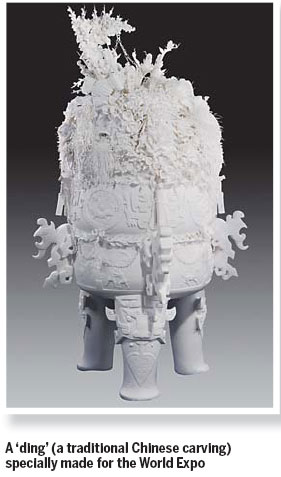
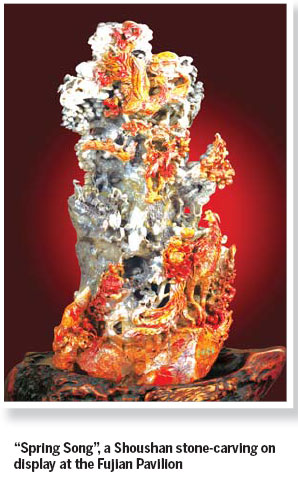
(China Daily 04/30/2010 page15)
